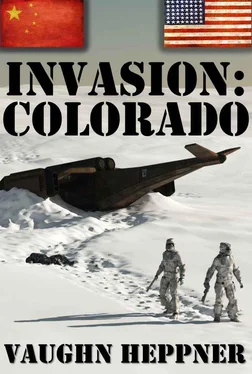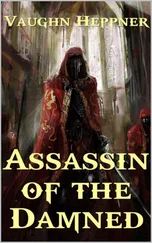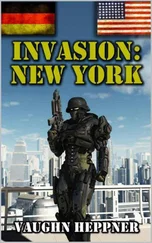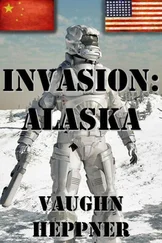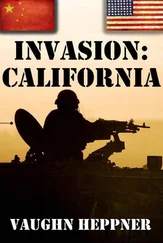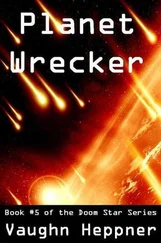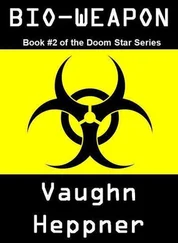“We’ll do this together,” Romo said. “You shoot. I’ll spot.”
“Are you with me then?” Paul asked.
“You have the madness tonight, the rage. You need to strike back. I understand.”
“We’ll crawl the rest of the way there,” Paul said.
“And die of hypothermia because we’re soaked,” Romo said. “What good is that? No. We must walk. If someone sees us, they see us, but I doubt they’ll be looking on a night like this.”
Wordlessly, Paul rose and began trudging closer. He didn’t know who was crazier, the Chinese or him. Once he starting shooting, the Chinese would know he was out here. They would start hunting for them. Was that worth it?
He wiped water out his eyes. It was cold and he was losing strength. He needed to use his head, to think.
“Wait a minute,” Paul said. He crouched down, using the slicker as a giant hood. Pulling out his binoculars, he scanned the traffic jam. Ah, what was this?
“There,” he said, pointing into the darkness. It was to their left. “Someone took a jeep out there and got stuck. It looks like they left the vehicle.”
Romo had out his binoculars, too. “I see it.”
“Ready?”
“There might be troops hidden in it,” Romo said.
“If only we could be that lucky. Did you see the open door? I think they left it.”
Fifteen minutes later, the two commandos warily approached the Chinese jeep. The front was tilted down, with the driver’s side tire bogged in a sinkhole. The rear tires were sunken down to the axle. The driver’s door was open, as Paul had mentioned earlier, and the vehicle was empty.
Paul climbed in first. The rain pelted the roof and reminded him of a better time with Cheri. He’d been young, strong and going to college on a football scholarship. Those had been his sweetest years with her.
Romo slid into the driver’s seat. He used the starter button. The engine turned over and coughed into life. Romo shut the door and found the heater. He turned it on and grinned at Paul.
Hunkering by it, Paul warmed his hands. The heat felt good on his cheeks. He wasn’t sure he ever wanted to leave the jeep.
“We might as well eat,” Romo said.
Paul nodded, pulling out some rations. Afterward, he rolled down a window and used the night vision binoculars. The bridge was a mile away, though some of the clogged traffic looked to be at the maximum range of his M25, at least the maximum on a night like this.
Romo rolled down the back window. “Get your rifle ready.”
First taking out a sound suppressor, Paul screwed it onto the end. With all the noise down there and the covering rain, he wasn’t worried any Chinese soldier would hear the gun. Muzzle flash might give him away, but not with the sound suppressor in place.
Romo moved around until he looked comfortable. He used binoculars, spotting for Paul.
“Wait a minute,” Paul said.
Romo looked up.
“What’s what?” Paul asked, pointing.
Rome shifted his binoculars.
Paul used the M25’s scope. A small convoy of new vehicles approached the end of the traffic jam. They were sleek hovertanks, some with bubble cupolas at the top of the turret.
Paul remembered these fighting vehicles from Alaska, from his trek across the Arctic ice. They were the Leopard Z-6 hovertanks. He’d examined several destroyed ones in Alaska—that was seven years ago now. Each of those down there used a high-velocity 76mm cannon and fired rocket-assisted shells. The 12.7mm machine gun in the commander’s copula provided anti-infantry fire. The hovertanks wouldn’t have any difficulty zipping out here to the jeep. Their turbofans lifted the vehicle on a cushion of air, meaning they flew a good foot over the mud.
“That’s trouble for us,” Romo said.
Paul nodded. The hovertanks were one of the Chinese ace cards in this war. They had thousands of them. The vehicle’s ceramic/ultra-aluminum armor wasn’t nearly as good as the heavy armor on a main Chinese battle tank, but it was good enough against most infantry weapons. Neither mud nor water slowed down those dogs. He’d heard how many hovertanks doubled as supply carriers, bringing needed ammo to otherwise bogged-down Chinese formations. You could always tell when the hovertanks did that. The armored skirts sank to only an inch above the ground and dust or muddy water billowed as if hit by a whirlwind.
“Let’s wait until they leave,” Romo suggested.
Paul was thinking the same thing. Then big klieg lights snapped on from the hovertanks. The beams washed across the waiting trunks and IFVs. A voice using a bullhorn began shouting orders.
It brought chaos to the waiting Chinese. Soldiers threw their cigarettes into the mud. Men began shoving and pushing. Drivers jumped out of the trucks and ran around.
“What is this?” Romo asked.
More klieg lights snapped on from the other hovertanks. The rain picked up, too. It slashed through the bright light, giving the situation an eerie feel. Soon, the chaos changed as soldiers lined up in ranks. Drivers also lined up, many straightening their uniforms.
“It looks like an inspection,” Romo said.
Paul swiveled his M25, using the scope to study the hovertanks. He hated them. They were fast and agile. Any one of those hovers could aim a floodlight on the jeep out here. A hovertank’s cannon could send a shell screaming into this vehicle.
“We’re hoofing it out of here,” Paul said. Then he saw something that changed his mind.
A thin Chinese commander opened his cupola at the top of a hovertank turret. The man climbed higher so his torso stuck out of the hatch. He wore rain gear, and he looked around. Paul spotted the three shiny stars on the man’s plastic-coated military hat.
“We have ourselves a three-star general,” Paul whispered. “He must be a real fire-eater too, to come out in this weather for an unannounced inspection.”
“My friend, I hope you are not thinking—”
“Yeah,” Paul said. “That’s exactly what we’re going to do.”
Romo’s shoulders might have slumped the slightest bit, but he nodded a moment later.
“First, we have to relocate,” Paul said. “They’ll shell the jeep first thing.”
The two commandos rolled up the windows and prepped their gear. Soon, Paul stepped back into the rain and mud. Romo followed. They trudged toward the enemy, toward the rows upon rows of Chinese soldiery, with the slowly moving hovertank inching before the mass. The general saluted the men, studying them in the harsh glare.
“Okay,” Paul said. He pulled out a poncho, putting it on the mud. He lay on it and adjusted the camouflaged slicker over him. Then he set up a bipod at the end of his rifle. He was going to need a steady base to make this long-distance shot. Romo lay beside him, using his binoculars.
Now Paul waited. He lay in the dark, with the rain turning back to drizzle. His heart hammered, and he tried to stop his hands from shaking. He readjusted the M25 several times. This was crazy. If he fired, those Chinese SOBs would be all over here hunting for Romo and him. But he couldn’t let it go. The drone operators had run out of smart bombs again. America wasn’t going to win this war if everyone played it safe. They were going to have to take chances, maybe even crazy chances to drive the enemy where he belonged.
I can’t take out the bridge by myself, but I can take out the brains to a division or maybe even to a Chinese corps .
“Every little bit helps,” Paul muttered to himself.
“Seven hundred, maybe seven hundred and twenty meters,” Romo said, as he stared through his binoculars, giving him the distance.
Paul put his right eye to the scope and he adjusted, using Romo’s info. Soon, the crosshairs touched the general’s head. For this shot, for possibly dying in turn, Paul wanted it all. He wanted a kill, not just to wound the man in the shoulder or take out a lung.
Читать дальше
